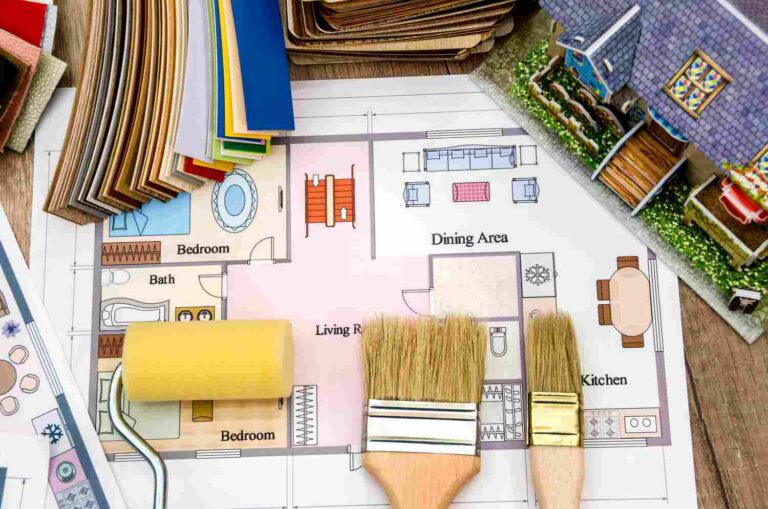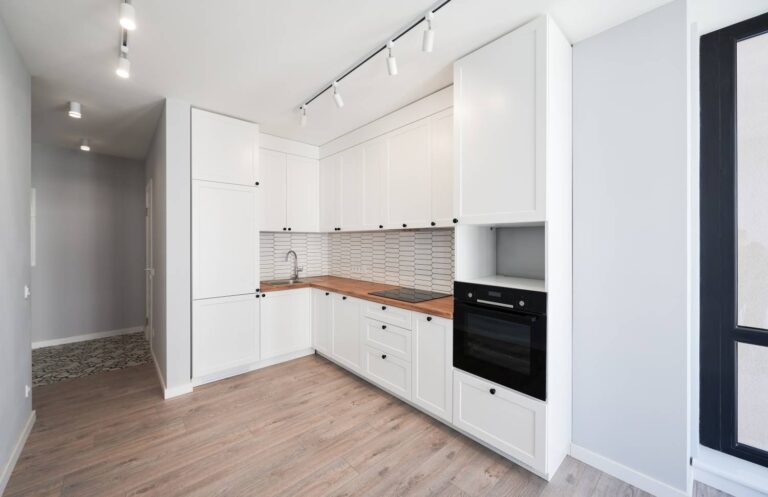- 17 September 2024
- 4 min read
House renovation plan – what do you need to take into account?

Table of contents
- Understanding your house renovation plan goals
- Creating a house renovation plan budget
- Developing a house renovation plan timeline
- Hiring the right professionals for your house renovation plan
- Permits and regulations in your house renovation plan
- Selecting materials and finishes for your house renovation plan
- Addressing structural changes in your house renovation plan
- Managing waste and recycling in your house renovation plan
- Final inspections and approvals in your house renovation plan
- Post-renovation considerations in your house renovation plan
Understanding your house renovation plan goals
Before diving into any plan for house renovation, it’s crucial to clearly define your goals. Are you looking to increase your home’s value, improve functionality, or simply refresh the space’s aesthetic? Understanding the primary purpose of the renovation helps guide decisions throughout the process, from budgeting to material selection. Think about both your current needs and future plans—whether expanding for a growing family or enhancing comfort for long-term living. Clear objectives ensure your renovation plan stays focused, efficient, and aligned with your vision.
Creating a house renovation plan budget
Creating a detailed budget is essential for a successful house renovation plan. Start by listing all anticipated expenses, including materials, labor, permits, and unexpected contingencies, which should account for around 10-20% of your budget. Research the costs of materials and get multiple quotes from contractors to ensure accurate estimates. Prioritize critical upgrades over cosmetic ones if budget constraints arise. Keeping track of expenses throughout the project is vital to avoid overspending. With a well-planned budget, you can confidently manage your renovation without financial surprises.
Developing a house renovation plan timeline
A clear timeline is key to a smooth house renovation. Begin by identifying the project’s major phases, such as design, demolition, construction, and finishing touches. Estimate the time needed for each step, considering factors like material delivery and contractor availability. Allow some buffer time for unexpected delays. Set milestones to track progress and stay on schedule. A realistic timeline keeps the renovation organized and ensures that all tasks are completed efficiently and on time.
Hiring the right professionals for your house renovation plan
Hiring the right professionals is crucial for a successful renovation. Start by researching contractors, architects, or designers with solid reputations and relevant experience. Request multiple quotes and check references or reviews. Ensure they are licensed, insured, and familiar with local regulations. Clear communication is essential, so choose professionals who understand your vision and can collaborate effectively. The right team ensures quality work, keeps the project on track, and helps avoid costly mistakes.
Permits and regulations in your house renovation plan
Navigating permits and regulations is a vital step in any house renovation plan. Before starting, research local building codes to determine which permits are required for your project, such as for structural changes, plumbing, or electrical work. Failing to secure the right permits can lead to fines, delays, or complications when selling your home. Consult with your contractor or local authorities to ensure compliance with zoning laws and safety regulations. Properly handling permits not only keeps your project legal but also ensures the work meets essential standards.
Selecting materials and finishes for your house renovation plan
Choosing the right materials and finishes balances style, function, and budget. Consider durability for high-traffic areas, like flooring or countertops, while focusing on aesthetics for visible features like paint, tiles, or fixtures. Research options that suit your design vision without compromising quality. Also, factor in maintenance needs and eco-friendly alternatives. Thoughtful material selection enhances both the look and longevity of your renovation.
Addressing structural changes in your house renovation plan
Structural changes are critical and require careful planning. Start by consulting a structural engineer or architect to assess load-bearing walls, foundation stability, and overall safety. These changes may involve altering layouts, adding rooms, or reinforcing support beams. Always ensure that structural modifications comply with local codes and regulations. Properly planned and executed, these changes enhance both safety and functionality.
Managing waste and recycling in your house renovation plan
Effective waste management is essential in any renovation plan. Start by estimating the debris types—such as old fixtures, drywall, or flooring. Rent a dumpster if necessary and designate separate bins for recyclable materials like metal, wood, and plastics. Consider donating reusable items to reduce landfill waste. Work with contractors who prioritize eco-friendly disposal practices. Planning waste management ahead ensures a cleaner, more organized project and supports environmental responsibility.
Final inspections and approvals in your house renovation plan
Final inspections ensure your renovation meets safety standards and complies with local codes. Schedule inspections for key elements like electrical, plumbing, and structural changes. Your contractor should coordinate with local authorities to secure necessary approvals. Passing these inspections is crucial for legal compliance and long-term safety. Once approved, you can confidently move forward, knowing your renovation is up to code and complete.
Post-renovation considerations in your house renovation plan
After your renovation, focus on post-project tasks to ensure everything is in top shape. Start with a thorough cleaning to remove dust and debris. Conduct a final walkthrough to check for any overlooked details or touch-ups. Review warranties and maintenance instructions for new installations or materials. Consider long-term upkeep, such as regular inspections or seasonal maintenance. Properly addressing these post-renovation steps ensures your home stays in excellent condition for years to come.
You might be interested in...
- Building advice
- Renovation advice

17 September 2024
The cost of a new kitchen – what expenses do you have to take into account?
When planning for a new kitchen, several key expenses need consideration. These include cabinetry, appliances, countertops, flooring, and installation. Additionally, you should factor in costs for lighting, plumbing, and finishing touches. Each of these components varies widely in price based on quality, materials, and customization. It’s important to get detailed quotes and plan for contingencies to ensure your budget covers all aspects of the renovation.